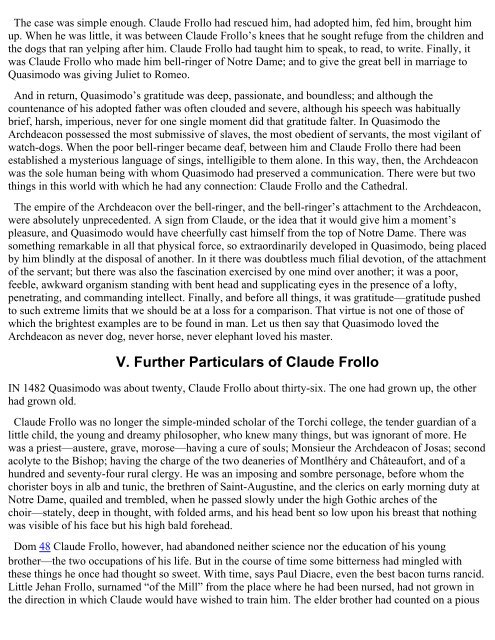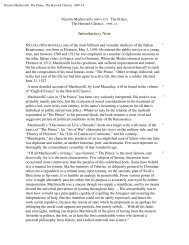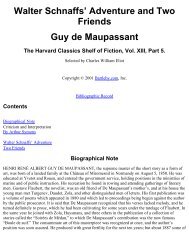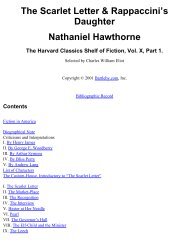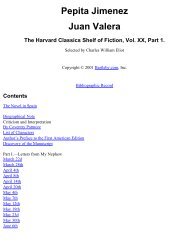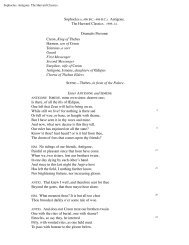Notre Dame de Paris - Bartleby.com
Notre Dame de Paris - Bartleby.com
Notre Dame de Paris - Bartleby.com
Create successful ePaper yourself
Turn your PDF publications into a flip-book with our unique Google optimized e-Paper software.
The case was simple enough. Clau<strong>de</strong> Frollo had rescued him, had adopted him, fed him, brought him<br />
up. When he was little, it was between Clau<strong>de</strong> Frollo’s knees that he sought refuge from the children and<br />
the dogs that ran yelping after him. Clau<strong>de</strong> Frollo had taught him to speak, to read, to write. Finally, it<br />
was Clau<strong>de</strong> Frollo who ma<strong>de</strong> him bell-ringer of <strong>Notre</strong> <strong>Dame</strong>; and to give the great bell in marriage to<br />
Quasimodo was giving Juliet to Romeo.<br />
And in return, Quasimodo’s gratitu<strong>de</strong> was <strong>de</strong>ep, passionate, and boundless; and although the<br />
countenance of his adopted father was often clou<strong>de</strong>d and severe, although his speech was habitually<br />
brief, harsh, imperious, never for one single moment did that gratitu<strong>de</strong> falter. In Quasimodo the<br />
Arch<strong>de</strong>acon possessed the most submissive of slaves, the most obedient of servants, the most vigilant of<br />
watch-dogs. When the poor bell-ringer became <strong>de</strong>af, between him and Clau<strong>de</strong> Frollo there had been<br />
established a mysterious language of sings, intelligible to them alone. In this way, then, the Arch<strong>de</strong>acon<br />
was the sole human being with whom Quasimodo had preserved a <strong>com</strong>munication. There were but two<br />
things in this world with which he had any connection: Clau<strong>de</strong> Frollo and the Cathedral.<br />
The empire of the Arch<strong>de</strong>acon over the bell-ringer, and the bell-ringer’s attachment to the Arch<strong>de</strong>acon,<br />
were absolutely unprece<strong>de</strong>nted. A sign from Clau<strong>de</strong>, or the i<strong>de</strong>a that it would give him a moment’s<br />
pleasure, and Quasimodo would have cheerfully cast himself from the top of <strong>Notre</strong> <strong>Dame</strong>. There was<br />
something remarkable in all that physical force, so extraordinarily <strong>de</strong>veloped in Quasimodo, being placed<br />
by him blindly at the disposal of another. In it there was doubtless much filial <strong>de</strong>votion, of the attachment<br />
of the servant; but there was also the fascination exercised by one mind over another; it was a poor,<br />
feeble, awkward organism standing with bent head and supplicating eyes in the presence of a lofty,<br />
penetrating, and <strong>com</strong>manding intellect. Finally, and before all things, it was gratitu<strong>de</strong>—gratitu<strong>de</strong> pushed<br />
to such extreme limits that we should be at a loss for a <strong>com</strong>parison. That virtue is not one of those of<br />
which the brightest examples are to be found in man. Let us then say that Quasimodo loved the<br />
Arch<strong>de</strong>acon as never dog, never horse, never elephant loved his master.<br />
V. Further Particulars of Clau<strong>de</strong> Frollo<br />
IN 1482 Quasimodo was about twenty, Clau<strong>de</strong> Frollo about thirty-six. The one had grown up, the other<br />
had grown old.<br />
Clau<strong>de</strong> Frollo was no longer the simple-min<strong>de</strong>d scholar of the Torchi college, the ten<strong>de</strong>r guardian of a<br />
little child, the young and dreamy philosopher, who knew many things, but was ignorant of more. He<br />
was a priest—austere, grave, morose—having a cure of souls; Monsieur the Arch<strong>de</strong>acon of Josas; second<br />
acolyte to the Bishop; having the charge of the two <strong>de</strong>aneries of Montlhéry and Châteaufort, and of a<br />
hundred and seventy-four rural clergy. He was an imposing and sombre personage, before whom the<br />
chorister boys in alb and tunic, the brethren of Saint-Augustine, and the clerics on early morning duty at<br />
<strong>Notre</strong> <strong>Dame</strong>, quailed and trembled, when he passed slowly un<strong>de</strong>r the high Gothic arches of the<br />
choir—stately, <strong>de</strong>ep in thought, with fol<strong>de</strong>d arms, and his head bent so low upon his breast that nothing<br />
was visible of his face but his high bald forehead.<br />
Dom 48 Clau<strong>de</strong> Frollo, however, had abandoned neither science nor the education of his young<br />
brother—the two occupations of his life. But in the course of time some bitterness had mingled with<br />
these things he once had thought so sweet. With time, says Paul Diacre, even the best bacon turns rancid.<br />
Little Jehan Frollo, surnamed “of the Mill” from the place where he had been nursed, had not grown in<br />
the direction in which Clau<strong>de</strong> would have wished to train him. The el<strong>de</strong>r brother had counted on a pious


